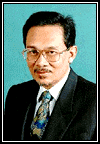|
|

|
 |

 |
13 April 1998

Although reading is not a de rigueur of Mahathir's Vision 2020 Cabinet, it
is not discouraged. The Deputy Prime Minister and Minister of Finance, so the legend
says, has managed to read nearly all the new titles which have been published in
Malaysia this year and last year!
Not only that, Datuk Seri Anwar Ibrahim is reputed to have read nearly all of Shakespeare,
Charles Dickens, Graham Greene, Hemingway, Iqbal, Naipaul, Tolstoy, Tagore, Victor
Hugo, Plato, Aristotle, Norman Mailer, Chinese greats (Confucius, in particular)
and Japanese near-greats. However, he seems to have made a real dent in a vast series
devoted to Islam, century by century, beginning with the Koran.
Anwar enjoyed debating as a student at the Malay College Kuala Kangsar and at Universiti
Malaya. He then enjoyed and loved mock politics, so like the real world he is in
today.
When he addresses the two meetings in New York on Tuesday and Wednesday, both organised
by the 75year old high-toned Council On Foreign Relations, which is an exclusive
dinner-cum roundtable discussion and a luncheon for specially invited guests only,
he would need to display much more than charm, eloquence and elegance to convince
his listeners about the health of our economy and of our commitment to transparency,
and public accountability on the governance and management of the Malaysian economy
and finance.
I have been told that an exclusive group of 28 persons have been invited for dinner
and the list includes Richard Holbrooke, the hardnosed New York lawyer who brokered
peace in Bosnia and vice chairman of Credit Suisse First Boston, the Prime Minister's
bete noire, George Soros, the currency dealer and chairman of Soros Fund Management
and a friend of Burma as against Myanmar, Filipino tycoon, Washington Sycip, chairman
of the SGV Group in Manila, William Rhodes vice chairman of Citibank, Robert Hormats,
vice chairman of Goldman Sachs, Maurice Greenburg, chairman and CEO of the American
International Group Inc. and other well-heeled captains of industry and experts on
foreign relations and diplomacy.
This year alone, up to the time of writing, the council has organised 79 conferences
and discussions not dissimilar to what will take place on Tuesday and Wednesday.
The last Asean leader to address the council was the Prime Minister of Thailand,
Chuan Leekpai, on March 11, the same day the Tun Razak's 76th birthday. Leekpai who
is the first Thai Prime Minister for Southern Thailand, summarized in these words
what hit South East Asian economies:
"To a certain extent, countries in the South East Asian region have learnt their
hard lessons from the current crises. The so called 'penalties of capitalism' have
already taken their toll. They are going through an adjustment process. However,
their fundamentals are still relatively strong. I believe that eventually all of
them will bounce back - although at different paces, in slightly different ways,
according to their respective sets of circumstances. They are all determined to cross
over these 'troubled waters' by accepting great pains and sacrifices. They deserve
your sympathy, your support and your respect.
"It is my hope that East Asia's financial and economic crises do not spread
to other parts of the world, as they will surely do if left untreated. The world
is too interdependent for any one to remain immune forever."
"It is my hope that the international community will use these crises as an
opportunity to learn, to gain valuable experiences, and to make preparations to make
sure that such tragedies will never happen again so that liberalization, which I
firmly believe to be the right path, can proceed in countries like Thailand in consonance
with global trends.
"It is also my hope that our friends and partners will assist us during this
critical period of economic adjustment, building upon the momentum we have already
started as we turn the corner. We in Thailand will play our part in the making of
a better world. We are confident that we can do so."
|

|
|
|
|